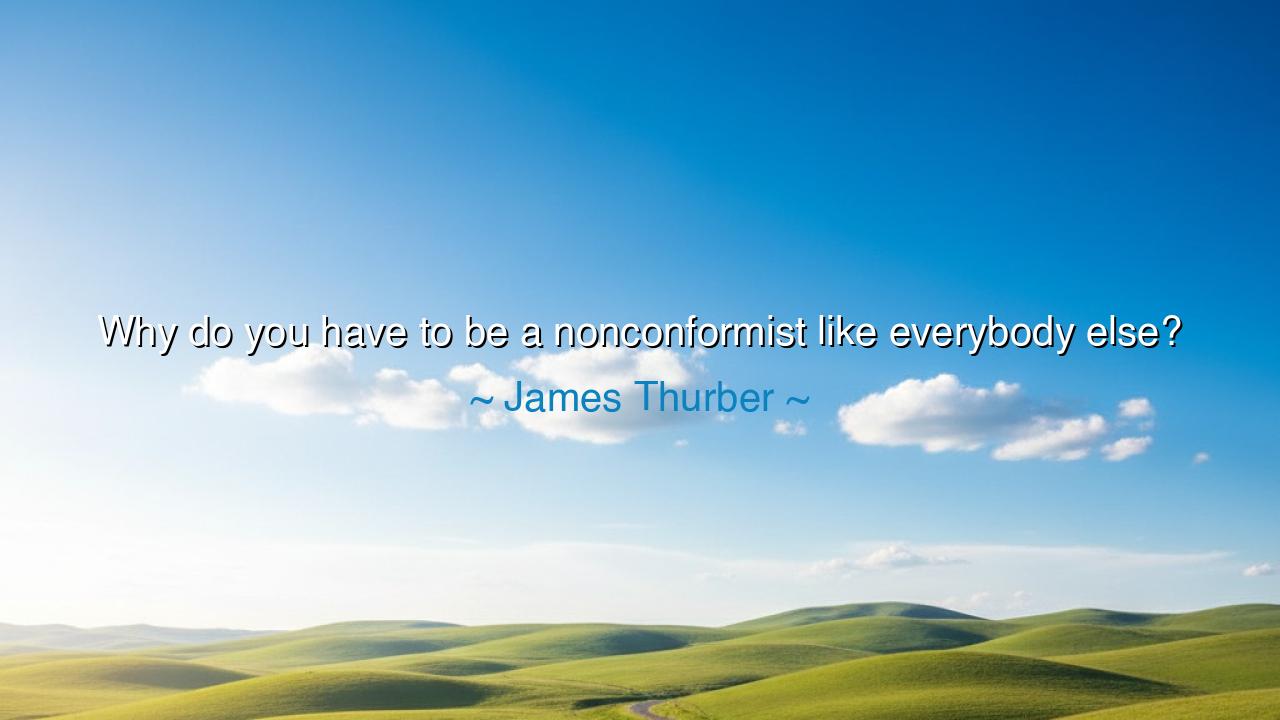
Why do you have to be a nonconformist like everybody else?






In an age when men sought rebellion as eagerly as their fathers had sought order, the great humorist James Thurber uttered his piercing jest: “Why do you have to be a nonconformist like everybody else?” To the unhearing ear, it is but a witticism — a clever twist of words meant to provoke laughter. Yet beneath its humor lies a deep lament, a warning to generations drunk on the illusion of individuality. For Thurber, ever the observer of the human heart, saw that rebellion itself had become a fashion, that even those who claimed to stand apart were marching in step with the crowd. His question, though wrapped in jest, is a cry from the soul: beware the conformity of those who pride themselves on being different.
In the manner of the ancients, let us interpret this not as mockery, but as wisdom hidden in laughter. Every age believes itself to be free, yet freedom often wears new chains — invisible, but no less binding. Thurber saw that the world was full of those who declared themselves “nonconformists,” yet their defiance followed the same rhythm, their rebellion echoed the same slogans. The herd had only changed its costume. What was once obedience to authority had become obedience to rebellion itself. Thus, Thurber’s question pierces through hypocrisy: how can one be truly free, if even one’s defiance is borrowed?
Consider the story of Socrates, that ancient master of inquiry. In a time when Athens boasted of its freedom, its citizens prided themselves on independence of thought. Yet when Socrates asked them to examine their own beliefs, to think truly for themselves, they turned upon him with rage. They praised originality in word but feared it in truth. Socrates stood alone — not a fashionable rebel, but a genuine one, whose independence was not of style but of soul. For this he drank the hemlock, yet his spirit endures, reminding all generations that true nonconformity begins not with appearance, but with the courage to question oneself.
Thurber’s wit is the modern echo of that ancient courage. His “nonconformist” is the youth who rebels because it is expected of him, who adopts the garb of defiance as another uniform. The words sting because they reveal our weakness: that we crave belonging even in our rebellion. We wish to be different, but not alone. And so we form tribes of nonconformists, collectives of uniqueness, all shouting the same anthem of individuality. In this, Thurber finds the tragedy and comedy of modern man — a being who flees conformity, only to conform to the flight itself.
Look also to the story of the Romantic poets, who rose in rebellion against the iron order of the Enlightenment. They sought emotion, nature, and freedom of spirit. Yet soon even their rebellion became a movement, with its own rules, expectations, and hierarchies. The poet who truly wished to break free — like William Blake, who saw angels in the trees and eternity in a grain of sand — was often shunned even by his fellow rebels. Blake’s independence was of the soul, not the season. Like Thurber’s wisdom, his example teaches that individuality is not what one declares, but what one quietly lives.
Thurber’s question, then, becomes a mirror for the ages. It asks each of us: Are you truly thinking for yourself, or only echoing another’s defiance? To be a real nonconformist is not to reject authority for its own sake, nor to chase novelty as proof of freedom. It is to listen inwardly — to hear the still voice of conscience above the roar of the crowd. That voice may lead you with others, or it may lead you apart; what matters is that it is yours, unborrowed, unforced, and unashamed.
Therefore, let the lesson be this: do not conform to nonconformity. Seek truth, not trend. Stand apart when conscience demands it, but never for the sake of being noticed. Let your uniqueness arise not from rebellion, but from authenticity. If you must differ, differ in spirit; if you must follow, follow in wisdom. Be not as those who shout for freedom while marching in chains of imitation. Instead, walk quietly, think deeply, and act truly. For the soul that lives by its own light need not announce its difference — it simply shines.
Thus, as Thurber’s laughter fades into the silence of reflection, remember: his jest was a prophecy. The world will ever tempt you to belong to some new rebellion, to wear your independence as a badge. But the wise know that the highest freedom lies beyond fashion, beyond approval. To be truly yourself — that is the rarest form of nonconformity, and the only one worth living.






AAdministratorAdministrator
Welcome, honored guests. Please leave a comment, we will respond soon